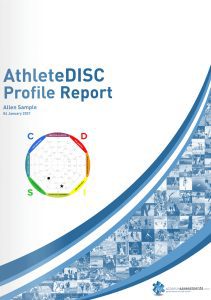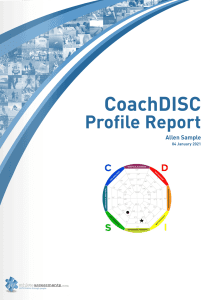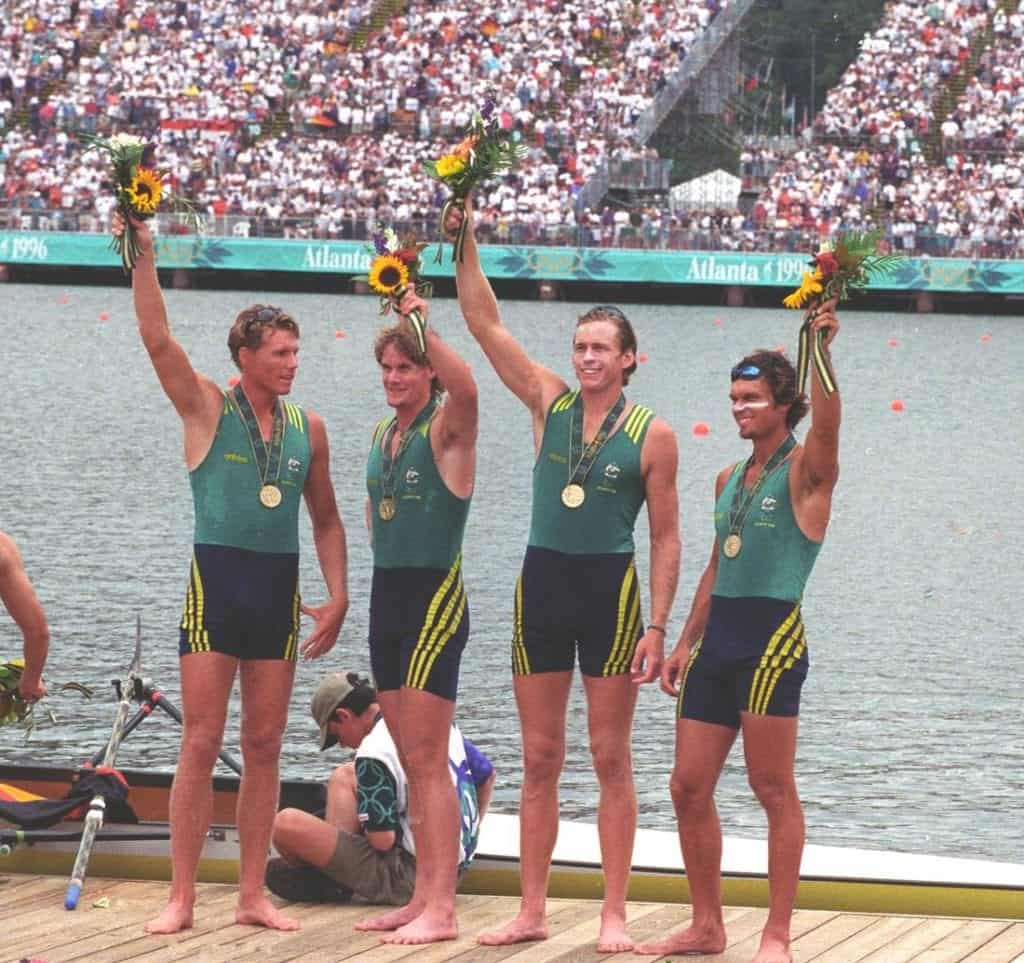DISC Methodology
The Role Personality Plays in Sports and the Development of Behavioral Profiling
Athlete Assessments’ AthleteDISC, CoachDISC and Sports ManagerDISC Profiles are the only sport specific behavioral profiles of their kind available in the world today. These unique profiling assessments draw on a large body of research relating to personality and behavioral theory which we will explore further.
The Role of Personality in Sport
Observing and responding to the personalities of people around us is a major part of our daily lives. Consciously or not, we are constantly responding to a range of personalities and behaviors that combine in countless ways in all sorts of different situations. This includes different individual’s personalities in sports training, teams and competition environments.
Personality is made up of the characteristic patterns of thoughts, feelings and behaviors making each of us unique and distinct. Research suggests that from approximately 21 years of age personality remains fairly consistent throughout life, even under varying circumstances and environments.

Profiling is a very effective tool to help you understand personality and behavior – both your own, and those of others. The importance of sports profiling cannot be overstated for any coach or athlete aspiring to reach their potential – no matter what level of sport they are involved in. This also applies and is just as important for those who work in the sports industry. Whether you’re the team manager, work in sports administration or other role within sport, you make a vital contribution to the success of your organization and or team. Understanding yourself and others plays a significant part in improving your results and how you connect with those you work with.
Personality Theory
There are different theories about how personality develops. Different schools of thought in psychology have influenced many of these theories.
The three major perspectives on personality are:
1
Type theory. The earliest theories suggest there are a limited number of ‘personality types’ of which we are born with and the individual develops a further preference over time. (For example, left or right-handed preference).
2
Trait theory. This theory views personality as the measurement of certain traits. Traits are habitual patterns of behavior, thought and emotion. Traits are stable over time, differ amongst individuals, and always influence our behaviors.
3
Behavioral theory. This theory suggests personality is a result of the interaction between the individual and the environment. Behavioral theorists study observable and measurable behaviors. The AthleteDISC, CoachDISC and Sports ManagerDISC model follows this theory.
A widely accepted view of the interactions of personality, behavior and the environment can be summed up in the work of Kurt Lewin. Kurt Lewin was a pioneer in the social psychology sciences. He is recognized as being the founder and first researcher to study team dynamics.
Lewin found that, in the debate of ‘nature versus nurture’, neither could claim to be sole contributor to a person’s behavior. Rather, it’s the interplay and combination of a person’s inherited tendencies (nature) and their life experiences (nurture) that creates the individual’s behavioral responses. This theory is the basis for the AthleteDISC, CoachDISC and Sports ManagerDISC model and methodology.
Behavior = the function of personality combined with the environment
Behavior is flexible, changeable and adaptable. Personality is not.
Athlete Assessments DISC Profiles
The AthleteDISC, CoachDISC, and Sports ManagerDISC are behavioral profiles, that is, they measure observable (external) behavior. Recognizing that personality is consistent, but behavior is flexible, is a central factor in the development and subsequent application of these profiles.
Like all people, athletes and coaches may behave differently in different situations and environments. For example, a common core factor impacting behavior is the level of pressure an athlete or coach is feeling. The same is true for any professional, including those working in the sports industry. By studying how individuals behave differently, we begin to understand the types of behavior creating poor or great performances. Besides understanding your own DISC style, you can also learn how to identify another person’s DISC behavioral style. Once the behavior profile is understood, it’s possible to modify and adapt behaviors to improve performance.
The AthleteDISC, CoachDISC, and Sports ManagerDISC profiling assessments create in-depth personalized reports identifying an individual’s core behavior style. The report identifies ways the person can apply their behavior style’s strengths or modify their style’s limitations.
It’s important to note there is no ‘best’ behavior style. Each style has its own strengths and its own opportunities for improvement and growth. The key is in recognizing and understanding each individual’s style. This is known as self-awareness.
Applying Your Profile / Becoming Self-Aware
Knowing your behavioral style is an example of being ‘self-aware’. Great athletes and coaches have self-awareness. They know what they do best, and where they need to improve. The same holds true for any successful individual, on or off the field.
Studies suggest that 75% of making behavioral changes is being self-aware of what you currently do.
Self-awareness is the recognition of our behaviors, our strengths and weaknesses, beliefs and values, and how this all creates the outcomes we experience in life. High level self-awareness goes deeper into our core beliefs and values, both of which shape our actions, decisions, and behaviors.
Developing self-awareness can help us to recognize the specific triggers creating certain emotional and behavioral responses. Self-awareness is also a prerequisite for effective communication and interpersonal relations, as well as for developing empathy for others.
The bottom line is, people perform in their chosen fields to a higher level if they have greater levels of self-awareness.
When we develop self-awareness, we can begin to choose the types of behaviors that create great and consistent performances.
Self-awareness is all about knowing where you are now, where you want to be in the future and how you plan on getting there.
The ability to modify your behavior is called behavioral flexibility or adaptability. Behavioral flexibility or adaptability is the degree to which an individual is able to adjust their behaviors to suit different environments, situations and people.
It is now apparent the highest performing teams, athletes, and coaches are those that are able to adapt to suit their environment, be it in training or in competition.
Social scientists call this ability to adapt and be flexible in our behavior ’emotional intelligence’.
Adapting Behaviors for Sporting Success
Once you, as a coach, athlete, or sports professional, become aware of your behaviors and how they influence performance, the ability to reach your potential is greatly enhanced. Behavioral adaptability follows a distinct process:
1
First, understand your current behavior patterns and the results these create for you as an athlete, coach or in your current role.
2
If you are not currently getting the desired results, you must be able to ‘DO’ something different.
3
In order to ‘DO’ something different, you need to be aware of the alternative choices/behaviors you can select from.
4
Finally, you must also WANT to adapt, or try a different behavior. This requires the right attitude, and trust in yourself (and your coach).
This is the crux of what the AthleteDISC, CoachDISC, and Sports ManagerDISC Profiles enables you to do.
Athlete Assessments’ DISC Profiles use proven techniques based on decades of behavioral research and are created and used specifically for sport. Each assessment provides a DISC Profile Report based on the results of a 12-minute
Get practical strategies to coach athletes to their individual needs. Know the behaviors producing their best performances for greater consistency when it counts the most. Help your athletes build self-awareness to make improvements and take greater responsibility for their behavior, on and off “the field”. Find out more!
The distinguishing factor of great Coaches is their constant pursuit for the competitive edge, in their athletes and themselves. Coaches will better understand their coaching styles (and their fellow-Coaches’ and staff) to find new ways to further improve their coaching and communication with athletes and others. Their coaching results will only further improve, guaranteed! Find out more!
Provide your people with a comprehensive understanding of themselves and those they work with. It quickly improves communication, working relationships and ultimately results. Use with recruitment, as a foundation for professional development plans or part of a team building exercise. Find out more!
Learn more about Athlete Assessments
DISC Profiling
Learn how to master the people side of sport using DISC Profiling...
What We Do
We specialize in helping our clients create and sustain winning results...
Resources
Stay at the forefront with access to our resources, articles, and videos






